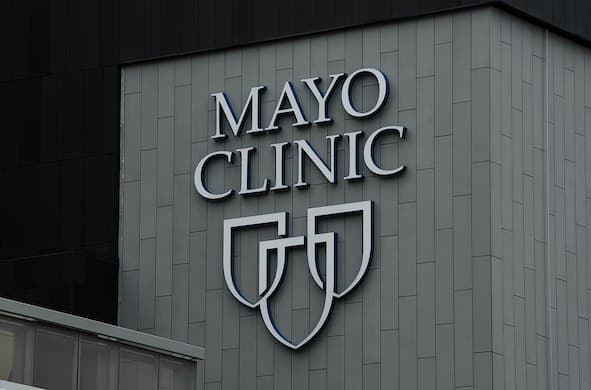In a Lawsuit Against Mayo Clinic, a Doctor Is Fighting for ‘Academic Freedom’
‘Academic institutions,’ his legal counsel says, ‘cannot entice talented students and faculty by promising academic and scientific freedom, only to discard those promises when they become inconvenient.’

Disputes over free speech appear to be transcending college campuses and entering the medical profession. An esteemed physician is going head-to-head with a world-class hospital, Mayo Clinic, which he accuses of violating his “academic and scientific freedom.”
Michael Joyner is suing the Mayo Clinic College and two of its leaders after they reprimanded him for his comments on sex-specific differences in sports performance and his criticism of the National Institutes of Health as “bureaucratic.” The lawsuit, filed Tuesday in Minnesota’s Third Judicial District, alleges that Mayo’s punitive actions run afoul of its policy on academic freedom and endanger the medical profession at large.
“Academic institutions cannot have it both ways — they cannot entice talented students and faculty by promising academic and scientific freedom, only to discard those promises when they become inconvenient,” a partner at Allen Harris Law, Samantha Harris, whose group is representing Dr. Joyner, tells the Sun. “If Mayo wants to prioritize politics and profits over academic and scientific integrity, it should be honest about its priorities.”
In a March 2022 New York Times article, Dr. Joyner discussed the “dramatic differences in performances” between male and female athletes after puberty, summarizing his research at Mayo, where he has held academic rank since 1992. For teenage boy athletes, he said, “testosterone is the 800-pound gorilla.”
In November of that year, Dr. Joyner advocated for a faster national response to the emerging Covid treatments of convalescent plasma, a subject he has studied to international acclaim. A CNN article reported that he was “frustrated” with the NIH’s “bureaucratic rope-a-dope,” whose Covid guidelines he called a “wet blanket.”
These comments reflected Dr. Joyner’s “scientific expertise,” the American Freedom Alliance, which is funding the lawsuit, says. Yet Mayo dealt him a one-week unpaid suspension, denied him a salary increase at his next annual review, and said he risked being fired for failing to comply with its public affairs guidelines on press interviews. The complaint calls this punishment “a sham investigation and discipline process.”
The lawsuit points to Mayo’s “Freedom of Expression and Academic Freedom Policy,” which states that faculty have the “freedom to explore all avenues of scholarship, research, and creative expression and to reach conclusions according to [their] own scholarly discernment.” The policy purports to ward against “fear of retribution or retaliation if those opinions and conclusions conflict with those of the faculty or [Mayo as an] institution.”
Mayo, meanwhile, deems Dr. Joyner’s accusations “baseless.” It argues he “is disingenuously invoking academic freedom as a shield to escape accountability for actions that violate Mayo policies and values,” it said in a statement emailed to the Sun. It points to his “well-documented disciplinary history” of “rude and disrespectful communications toward coworkers and outside partners.” His remarks on convalescent plasma are described as “unprofessional.”
To fierce advocates of the so-called truth, though, academic freedom is indeed at stake. “The medical profession joins academia, the media, and corporate America in the efforts to silence any and all with dissenting viewpoints that reflect reality and lived experience,” an activist and former collegiate swimmer, Riley Gaines, tells the Sun.
“As an athlete who has seen the effects of those in leadership positions who failed us, I’m grateful for Dr. Joyner’s commitment to the truth despite the outlandish repercussions,” Ms. Gaines, who fights against biological men competing in women’s collegiate sports after tying for fifth place at the NCAA Women’s Championships in 2022 with a biological male swimmer, Lia Thomas, says. “We need more like him to restore civility and sanity.”
In June, more than 200 physicians and scientists urged Mayo to reconsider its discipline of Dr. Joyner. These actions could tarnish the educational institution’s reputation by undermining public confidence in the honesty of statements from Mayo doctors. In a letter, they asked: “How can anyone now believe anything any doctor from Mayo says?”
Mayo earned a spot on the U.S. News & World Report’s “honor roll” this year. It was ranked the no. 1 hospital in America for seven years in a row. “If a leading medical school and academic medical center can suppress the speech of an internationally recognized faculty member,” the physicians and scientists said, “imagine how much easier it will become for less well-known institutions to penalize younger and less established faculty members.”
A successful lawsuit, though, “will set an important precedent about the right of other scientists, doctors, and academics to speak publicly and freely on topics relevant to their expertise,” the chairman of the AFA’s academic committee, Lucas Morel, said in a statement on Tuesday. Once the court sees the evidence, Dr. Joyner “is confident the truth will prevail,” Ms. Harris, who represents the doctor, says.

